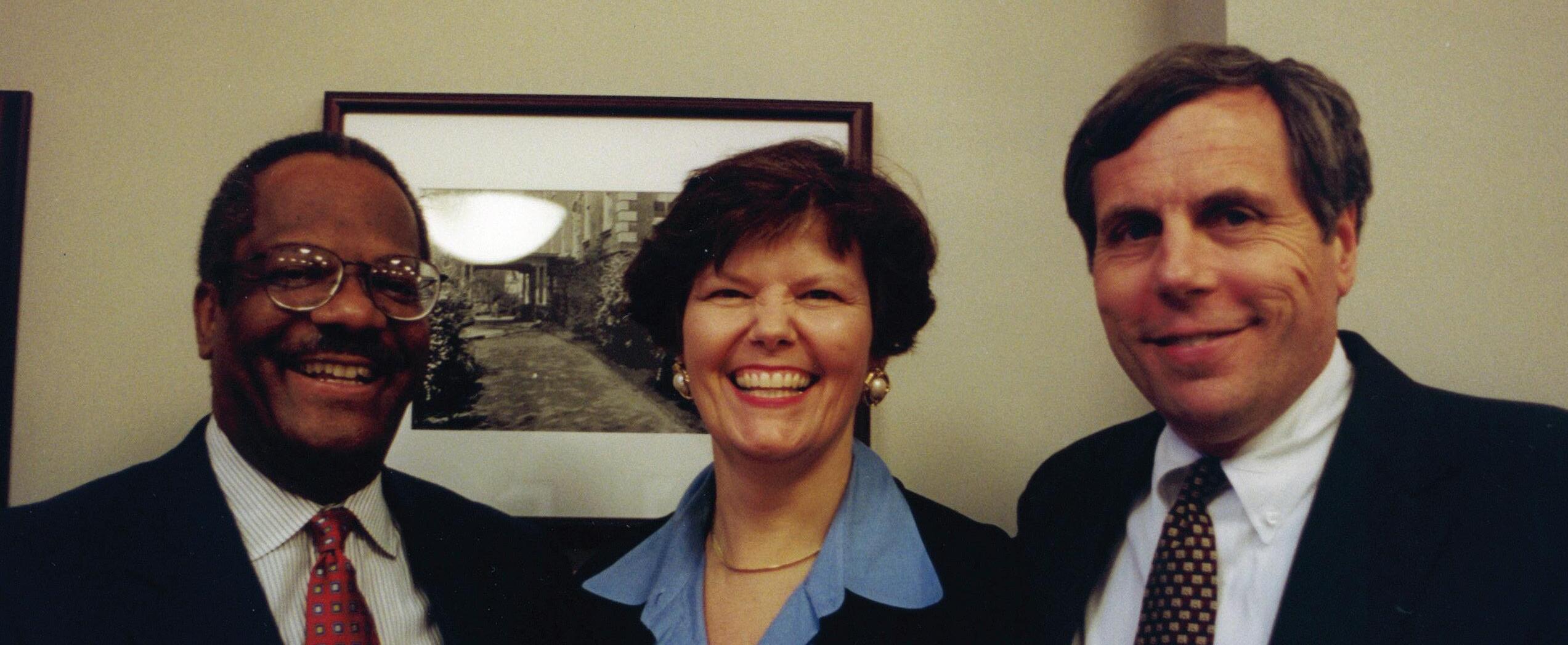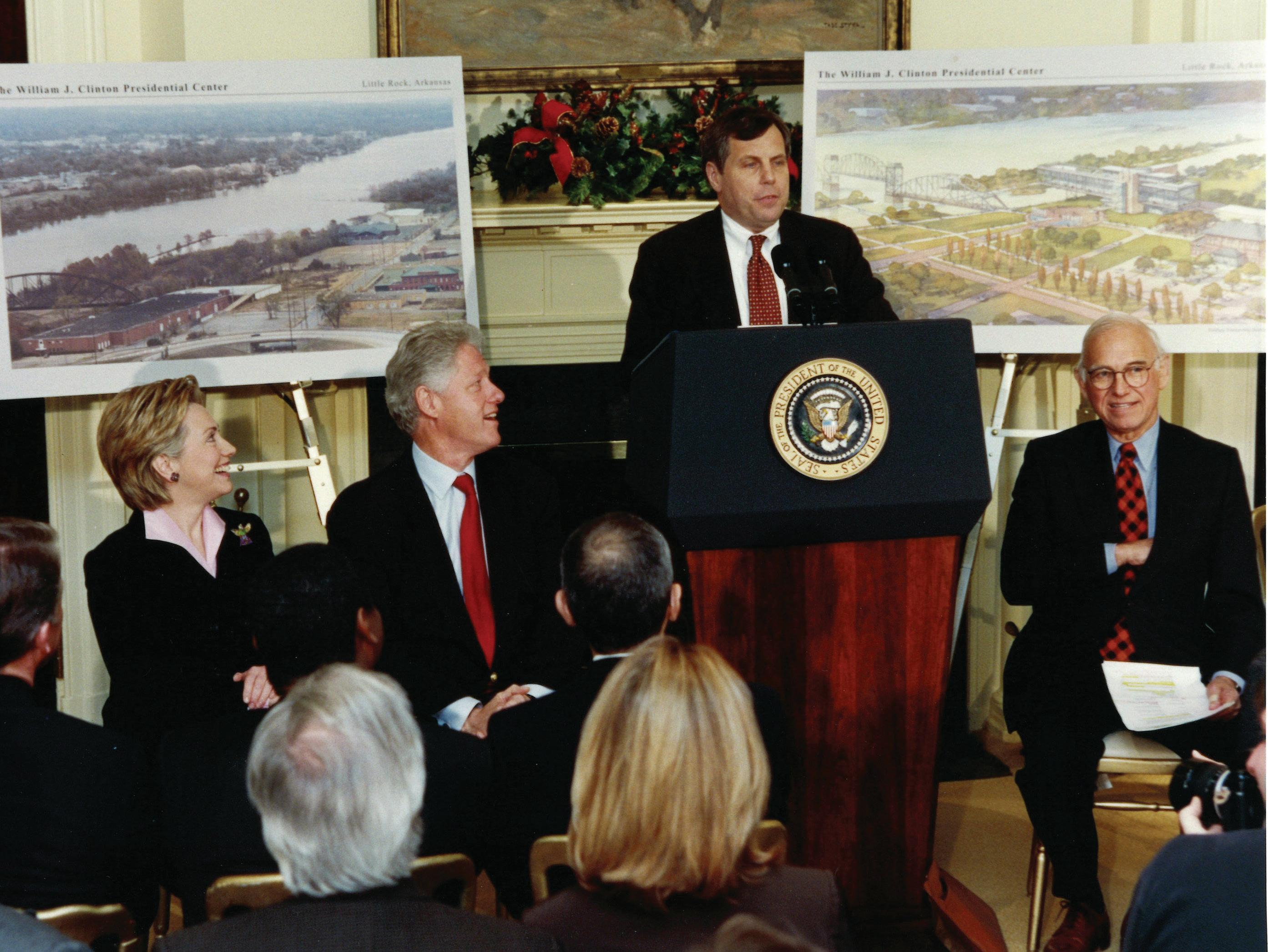Keep Public Business Open To The Public
Guest Column:
By Kevin Slimp
A foundation in journalism launched a public service career

Skip Rutherford read three newspapers a day growing up – the Arkansas Gazette, the Arkansas Democrat and his hometown Batesville Guard
“From the time I can remember my dad read newspapers regularly, and he always encouraged me to do the same,” Rutherford said. His dad especially wanted to keep up with news, business and sports. “He was not so much into politics,” he noted.
It wasn’t long before Rutherford’s newspaper interests started to expand. His mother grew up in Batesville, Miss., and he regularly visited his grandmother there in the summers. That piqued his interest in The Panolian, that community’s newspaper.
His mother received The Panolian by mail, noting it was the connection to her hometown. “And the Batesville Guard will always be your connection to your hometown,” she told her son.
While visiting the Mississippi community, Rutherford began reading the Memphis Commercial Appeal, adding to his knowledge of Eastern Arkansas, Tennessee and Mississippi.
He was surprised later when, as a student at the University of Arkansas in Fayetteville, he discovered he could purchase the Sunday’s Commercial Appeal at Palace Drug on Dickson Street. It was there he also added the Tulsa World and the Joplin Globe to his newspaper mix.
“On a lot of Sundays, I would buy all those papers, pick up a sandwich, go to the park and read,” he said. “I felt refreshed because
I was broadening my interests.”
He still received his hometown paper in the mail. “I am now a 55-year subscriber to the Batesville Guard,” he said.
This special interest in newspapers naturally led him to pursue a major in journalism at Fayetteville and editorship in 1971-72 of The Arkansas Traveler, the student newspaper on campus.

This love of newspapers was the key to his close relationship with Ernie Deane, long-time journalism professor at the University of Arkansas and a columnist for the Arkansas Gazette
While a student, he accompanied Deane to
the Arkansas Press Association convention in Hot Springs. Deane introduced him to many of the great names among the state’s community journalists – “the Dunlaps, the Schexnayders, the Magies, the Sanderses….you could go on and on.”
He was given business cards of newspaper folks from around the state and was able to visit in their hometowns later during his tenure as director of the Arkansas office for U.S. Sen. David Pryor.
Rutherford remained grateful for the opportunities opened to him by Deane, who died in 1991 at age 79.
“As a professor and advisor, Ernie inspired hundreds of students and connected many with professional opportunities,” Rutherford said. “As one of his students, I was always impressed with the guests and speakers that he brought to the campus and provided students time to interact with them. As Clinton School Dean, I tried to follow his example.”
Rutherford also commented on the importance of Deane’s contribution to the history and understanding of Arkansas through his columns and books.
“After Vance and Mary Celestia Parler Randolph and before Brooks Blevins, Ernie was the Arkansas authority and goto resource on the Ozarks,” Rutherford said. His ‘Ozarks Country’ newspaper column and his books helped preserve and promote the region’s history and heritage.”
Rutherford also stresses the contribution of the late Brenda Blagg, an Arkansas journalist who was a champion of the Arkansas Freedom of Information Act and
Arkansas Press Association Publisher Weekly Vol.18 | No. 23 | Thursday, June 8, 2023 | Serving Press and State
1873 Continued on Page 2
Since
8
Guest Editorial:
Arkansas Publisher Weekly 1 June 8, 2023
10
Improving Your Paper: No two newspapers are alike. At least, they shouldn’t be.
Skip Rutherford
A foundation in journalism launched a public service career
Continued from Page 1
open government. Her “Between the Lines” column ran in the Northwest Arkansas Democrat-Gazette and newspapers statewide from 1979 until shortly before her death in December of 2022. Blagg served as editor of the Arkansas Traveler two years before Rutherford.
“As a journalist and highly respected columnist Brenda was a fierce advocate and defender of the Freedom of Information,” Rutherford said. “She knew FOI issues inside and out and had a major influence on others.
“When history books are written about these years in Arkansas journalism, Brenda will be among the journalists and columnists at the top of the list.”
Now, in honor of Deane and Blagg, Rutherford is taking the lead in establishing an annual award for the outstanding columnist in Arkansas newspapers. He said it is appropriate as “both of them wrote many a column in their day.”
“I just think it will be a great tribute to two people who worked together and became great friends,” Rutherford said. “I am really excited about it.”
— From J-School to the Clinton School —
Following his graduation from Fayetteville, Rutherford began a storied career that involved working with many of the leading figures in Arkansas business, politics, journalism and community development.
His first brief stop was at Southwestern Bell before accepting a position as director of public relations at McIlroy Bank in Fayetteville. He was employed earlier at the banking firm while a student at the university.
“I liked the people there and it helped me expand my horizons,” Rutherford said. “It gave me an opportunity in a familiar environment, and I was able to develop my skill set.”
In 1979, he gained a tremendous career opportunity running the Arkansas office for Sen. Pryor. He had been greatly impressed with the Senator during a press session at that earlier APA convention in Hot Springs.

“It was literally one of the most enjoyable and uplifting experiences of my life,” Rutherford said of working with Sen. Pryor. He traveled across Arkansas, meeting people in all walks of life and assisting them with a wide range of issues. “I would direct them to the right person on the staff or often directly with the Senator,” he said.
“Sen. Pryor was the most humble and thoughtful public servant that I have ever known,” Rutherford said.
He recalled one occasion when Sen. Pryor complained visits to specific towns across the state were being “overscheduled” by the young assistant.
“’When I go into a small town, I don’t want to go in and then go right out,’” the Senator told Rutherford. “’Give me at least a couple of hours to visit with people.’”
“That was something I had never heard before from a politician,” Rutherford said. “For one thing, he was also a very good listener.”
Rutherford said Pryor served in a less divisive time in American politics and had a gift for working amicably with varied interests. Of current Arkansas political leaders, Rutherford said, “Sen. John Boozman treats people in a Pryor-like way, even when he disagrees with you.”
After five years with Sen. Pryor, Rutherford was employed by Mack McLarty as vice president of public affairs for ArkLa Gas. He remained in that position from 1984 to 1992.
Then came an exciting political experience in Rutherford’s life. He joined then-Gov. Bill Clinton’s Presidential Campaign Staff as one of the many Arkansans who helped the state’s governor become successful in what many national observers considered an improbable candidacy.
Rutherford was responsible for the states of Kentucky, Georgia, Louisiana, New Mexico and Colorado.
He said Clinton often was underestimated by analysts not realizing the importance of his extensive grassroots organization developed over the years. Clinton had established networks involving Georgetown University,
Arkansas Publisher Weekly 2 June 8, 2023 Continued on Page 3
Rutherford standing in the back of the Arkansas Traveler delivery vehicle in 1970. To the left is Ann Pride of Blytheville, who later worked with Rutherford on the staff of Senator David Pryor. On the right is Gerald Jordan of Malvern, who later after a career with the Philadelphia Inquirer became the first African-American journalism professor at the University of Arkansas.
A foundation in journalism launched a public service career
Continued from Page 2
Rhodes Scholars, Yale, the University of Arkansas School of Law and, of course, Arkansas itself.
“He had been all over Arkansas and was a master of retail politics,” Rutherford said, in reference to a time when voters knew their politicians by their first name. “People knew him and he knew them.”
That paid dividends in his well-organized race for the presidency as “Arkansas Travelers” embarked to points all over the country assisting in his campaign. The effort focused on “local issues” in the various states and then coupled that, of course, with the national campaign. The result was a two-term presidency for an unlikely candidate from a small state.
“Number one, he is smart,” Rutherford said in reference to Clinton’s success as a candidate and a leader. “He also knew and understood the issues and surrounded himself with very capable advisors.
“He also had a great ability to connect with people,” Rutherford added, noting he could work with opposing politicians such as Newt Gingrich and Trent Lott. “He could be effective no matter how strong the disagreement.
“Clinton was just a very effective communicator,” he added.” After the Clinton win, Rutherford was faced with one of his life’s most difficult decisions. McLarty became the President’s Chief of Staff and, of course, Rutherford would have an opportunity to serve in an important capacity in Washington, D.C.

“It actually came down to one of those 51-49 decisions,” Rutherford said. “In some ways it was the thrill of a lifetime to have that opportunity (to work in Washington).
“I weighed it really hard, but I had three children at home at the time and I decided to stay in Arkansas. I believe it was the right call.”
At that point he decided to visit Ron Robinson at Cranford Johnson Robinson Woods, the premier advertising and public relations firm in the state. Robinson was surprised by the news that Rutherford was not going to Washington and then shortly came back with a job offer as executive vice president.
The affirmative decision led to a successful professional stint of 13 years with CJRW. During that period Rutherford began a personally satisfying period of teaching classes (on a voluntary basis) at the University of Arkansas at Fayetteville, University of Central Arkansas, University of the Ozarks and Lyon College. He currently serves on the board of trustees at Lyon in his hometown of Batesville. He recently taught a class on the 2022 election at the school.
As it turned out, the connection with Bill Clinton was not over. In 1997, Rutherford became the first president of the Clinton Foundation (a non-paying position) and supervised the planning, construction and opening of the William J. Clinton Presidential Center and Park in Downtown Little Rock.
Rutherford was a “strong advocate” for locating the library in Arkansas and its ultimate location east of Interstate 30 in Little Rock.
There was opposition to the specific location, with Arkansas Gazette columnist Richard Allin calling it “Murky Bottoms.” Rutherford continued to promote the location, believing it could be a major step toward a more cohesive downtown area.
Rutherford clearly is proud of the result. “We were able to clean up a lot of blight,” he said of the project, which was completed in 2004. “We were able to change the image of Downtown Little Rock, but we also have changed the direction of tourism in Arkansas.”
Rutherford also is proud of other developments related to the
Continued on Page 4
Arkansas Publisher Weekly 3 June 8, 2023
Gerald Jordan, Ann Pride and Rutherford
A foundation in journalism launched a public service career
Continued from Page 3
library and the area, such as the pedestrian bridge to North Little Rock, the Heifer International headquarters and the planned dental and veterinary schools related to Lyon College.
“It was all a labor of love,” Rutherford said, “more love, but a lot of labor.”
Rutherford then completed a circle in his connection with David Pryor, as he succeeded his former boss and friend in 2006 as Dean of the Clinton School of Public Service on the grounds of the library center.

When offered the position by University of Arkansas System president B. Alan Sugg, he pointed out that he was not a tenured professor and was more oriented toward real-world experience. “’We are a real-world experience school,’” Sugg told him.
Rutherford said the mission of the school is to train young people in a graduate program to perform public service all over the world. “I had the opportunity to work alongside some great administrators, faculty and staff,” Rutherford said.
He remained in the position until 2021 and was involved in such
diverse student service projects as the Ronald McDonald House suite at UAMS, Newport’s Delta Arts Festival, West Memphis’ Community Kitchen, the Rwandan Scholars Program, The Greenhouse at Little Rock Children’s Library and a fresh water well in a remote village in Tanzania.
The Clinton School also is noted for inviting world class speakers to the campus. Rutherford said the goal is to feature a diverse group, with examples such as Ruth Bader Ginsburg, Brett Kavanaugh, Kevin McCarthy, Wayne LaPierre, John Lithgow, The Little Rock Nine, John McCain, Nancy Pelosi, Karl Rove, Bob Woodward and Ruth Lincoln (grandmother-in-law of Blanche Lincoln and at the time of her appearance 110 years-old, the oldest living Arkansan).
“It was a real joy for me to watch students succeed in service every day,” Rutherford said, noting the school usually had a range of 35 to 45 participants at any given time in the two-year program.
— Even in retirement, plenty to do —
Rutherford, 73, retired from the Clinton School in 2021.
Continued on Page 5
Arkansas Publisher Weekly 4 June 8, 2023
Rutherford with Hillary Rodham Clinton, President Bill Clinton and architect James Polshek at the White House unveiling of the Clinton Presidental Center.
Rutherford finds community correspondents provide local color
As a high school student, Skip Rutherford worked at his hometown Batesville Guard. One of his duties was editing the newspaper’s numerous “country correspondents,” writers who shared both the mundane and unique happenings in their specific rural areas – or as it might have been said then, their neck of the woods.
Rutherford said there normally was very little editing needed, as the tone of each writer didn’t need to be tampered with at the expense of losing originality.
“I always looked forward to this opportunity,” he said of reviewing and compiling the correspondents for each issue, “because I thought then and still do that these correspondents collectively reflected community newspapering at its finest.”
He said the country writers were at the top of his reading list in the Guard even after he left for college. “It was just a pleasure to read. It was a way of life that unfortunately has gone by the wayside.”
Here are some of his favorites from the 1960s: Strawberry (don’t have the correspondent’s name):
“Owen Ward was using a chain saw cutting wood one day last week and lost control of the saw and it cut his leg real bad. They took several stitches to sew it up. He can only walk backward as that way he doesn’t have to bend his knee.”
Pine Hill (correspondent Nellie Stout). She was Nellie Stout, Editor, Pine Hill News. She wrote the column for around 30 years.
“Mrs. Nellie Stout went on the school bus last Friday to Cushman and got her a permanent one. She got her curled for some friends that are supposed to come visit her and for Thanksgiving. Mrs. Glenna Gunther has the beauty shop in Cushman and she is a good one. She is so kind and friendly.”
“So now I will ring off and dress more and get my shoes on as my feet are getting cold, and I think I can beat the mailman, so I say bye bye for another week. Best wishes to one and all and I love you all.”
A foundation in journalism launched a public service career
Continued from Page 4
The list of Rutherford’s service endeavors seems never-ending. As examples, he was elected to the Little Rock School Board, served as chairman of the Arkansas Democratic Party, coordinated the 40th anniversary commemoration of the desegregation of Little Rock Central High School and has co-taught a Sunday school class at Pulaski Heights United Methodist Church. He also formed the Political Animals Club of Little Rock, a group which meets regularly to hear speakers, usually on the topic of politics.
In addition, he manages two family farms in Independence and Jackson counties.
As a board member at Lyon College, he is involved in the development of the school’s unique dental and veterinary programs in Little Rock.
He and his wife Billie have three children; Blake, who lives in Bentonville; Martha, a resident of Ashville, N.C., and Mary, who lives in Singapore with the Rutherfords’ two grandchildren. “Thank goodness for computers,” Rutherford said of the Singapore location.
Retirement is proving easier for Rutherford than anticipated. He said the isolation of Covid made working at a home office a comfortable routine. He is contemplating the possibility of writing a book sharing untold stories of public service and politics.
Through it all, Rutherford has never lost his love for newspapers. He is continuing that support in retirement by serving on the Arkansas Newspaper Foundation board of directors.
“I applaud the work the APA is doing,” he said. “I am doing what I can to help elevate journalists with programs like the Deane-Blagg Award.” He also contributes items from his vast store of political memorabilia to the Foundation’s annual auction.
Rutherford recognizes the myriad challenges to the newspaper industry and said creative ideas must be developed, such as hybrid models in both print and electronic delivery.
“It is my hope that community newspapers will come back,” he said, citing an example of how smaller regional banks now are developing again. He sees regional newspapers as one possibility, in which the product might cover several counties.
He said high school and college newspapers often are surprisingly vibrant and he regularly reads one, the monthly Central High Tiger
“The business community has to start investing in promoting newspapers,” Rutherford said. “Part of their responsibility is support of a local newspaper.”
Rutherford praised the model sustained by the Arkansas Democrat-Gazette. “You get a sense that this statewide newspaper really does care about local communities, and I appreciate that,” he said.
“I’m excited to be working with Skip for the second time in my career,” said APA Executive Director Ashley Kemp Wimberley. “He is one of the biggest advocates for community journalism in Arkansas, and no one is more passionate or committed to many important causes than him. The association is very fortunate to have someone of his caliber on the Arkansas Newspaper Foundation board.”
Arkansas Publisher Weekly 5 June 8, 2023
Former Arkansas State Rep.
Owens Shultz, mother of Arkansas Business founding publisher, dies
Marian Daniel Owens Ingram Shultz of Hot Springs Village died on Thursday, May 18. She was 86.


She was born in Beebe and reared in Searcy, the daughter of the White County Coroner, Circuit Clerk and funeral home part-owner William Elvis Daniel and his wife, Arlene McCulloch Daniel. As a young girl, she lived inside her family’s Daniel Funeral Home in Searcy.
As a student at Searcy High School, she wrote a school column for the Searcy newspaper, the Daily Citizen, and was a 1953 delegate to Arkansas Girls State.
She received an associate degree at Arkansas State Teachers (now UCA) in 1954. She married Wayne Owens in 1957 and moved to Warren, where they had their three children; Cynthia Blair Owens, Charles Daniel Owens and William H. Owens. Dan would later become the founding publisher of Arkansas Business in 1983.
She helped Wayne run the family business, Owens’ Shoes and Clothing, before entering real estate. In the early 1980s she took on a long-term male incumbent for a seat on the Warren City Council and became Warren’s first female city council member, serving several terms.
After her husband died, she was selected to become South Arkansas’s newest house member of the House of Representatives over two other candidates after long-time Rep. John Lipton took an appointment to the StateTransportation Board. She served three terms (1992-1998) before being term-limited. Her signature legislative act was sponsoring a ground-breaking 1995 bill requiring new teachers to undergo background checks, which drew national attention and became a template for similar laws in other states. Her legislative career is featured in “Stateswomen: A Centennial History of Arkansas Women Legislators 1922- 2022,” by Lindsley Armstrong Smith and Stephen L. Smith
She married Perry Marlin Ingram and settled in Norman, Oklahoma. After he unexpectedly died, she relocated to Charlotte, North Carolina, where both of her sons currently live. She married John Shultz, Jr. in 2017 and moved with him to Hot Springs Village.
In addition to her parents and two husbands, Owens Shultz was predeceased by her sister Emma Grace Daniel and brother Robert Elvis Daniel

















Survivors include her husband, daughter, two sons and daughtersin-law, and two grandchildren.
Funeral and burial was held May 26 in Beebe. A public Celebration of Life/Remembrance Service will be held Sunday, June 11 at 2 p.m. at the First United Methodist Church in Warren.
Nominations now open for “Operations All-Stars” contest










































Editor & Publisher magazine and the International Newspaper Group (ING) are looking to recognize “All-Stars” that work in the fast-paced news publishing Operations field.
This year E&P and ING will honor winners in three categories: Large Market All-Star, Small Market All-Star and Pre-Press AllStar. Winners will receive $2,000 each from ING, in addition to imPRESSions Worldwide and Cellmark paying their airfare to the ING Conference, September 29-October 1 in Indianapolis, Indiana.












Teresa McCrary, production manager at the Times-Herald in Forrest City, was named an Operations All-Star for small markets in 2022, the first in Arkansas to receive the designation. She received an expenses-paid trip to last year’s conference in Newport, Rhode Island, as well as a monetary prize from ING.
Nominations are open until June 30. To nominate the Operations All-Star at your publication, visit https://www.editorandpublisher. com/stories/stop-the-presses-operations-all-stars-class-of-2023nominate-a-colleague-today,231523


Arkansas Publisher Weekly 6 June 8, 2023
LET'S GET SOCIAL @ArkansasPressAssociation@ARPressAssoc
Marian Daniel Owens Ingram Shultz
Coffey named as new President & CEO at News/Media Alliance
The News/Media Alliance, a nonprofit trade association representing approximately 2,000 print and digital news and magazine media companies in the United States and Canada, has selected Danielle Coffey as its new President & Chief Executive Officer. Coffey, who previously served as the Alliance’s Executive Vice President and General Counsel, began in her new role on June 1.
Since joining the Alliance in 2015, Coffey has led the organization’s advocacy and strategy initiatives with a focus on the digital future for news, including spearheading the introduction of key legislation and advocating for a more favorable regulatory environment by leading the effort on advancing legislation that would require Big Tech platforms to fairly compensate news publishers for use of
their content. Prior to her role at the News/ Media Alliance, Coffey was Vice President and General Counsel for the Telecommunications Industry Association.

Coffey is a graduate of San Diego State University and earned her Juris Doctorate from the Catholic University Law School, with a specialization in Communications Law. She serves on the board of directors of the National Press Club Journalism Institute.

“It will be an honor to lead the Alliance and this industry towards a strong and thriving future,” Coffey said. “I see tremendous opportunity for our expanded membership that now includes news publishers, magazines, and digital publications. Our contributions to enriching society and democracy are limitless.”

Arkansas Publisher Weekly 7 June 8, 2023
Danielle Coffey
Guest Editorial: Keep Public Business Open To The Public
Originally published in the Johnson County Graphic, May 17, 2023. Reprinted with permission.
After Governor Winthrop Rockefeller signed the Arkansas Freedom of Information Act (FOIA) into law in 1967, he commented that the law had “taken the government out of the smoke-filled rooms and returned it to the people.”
Often referred to as “the people’s law,” Arkansas’s version of the Freedom of Information Act is considered to be one of the nation’s strongest. Its intent is to ensure transparency in government, to provide that public business is conducted in the open. Our elected officials and public bodies in Johnson County work hard to serve the citizens they represent and The Graphic has cooperative, working relationships with all of them and appreciate the willingness they have to share information with us and the public and we look forward to continuing those relationships in the same way. It is, however, our duty as the press to ask hard questions. It is the duty of the press to look at the facts and to tell the truth. We take this very seriously which is why we feel it our responsibility to ask this question…

Is all our public business here in Clarksville and Johnson County being conducted in the open? Sadly, this apparently is not the case.
Clarksville’s 76-year-old utility company was recently stripped of its governing body by a vote of the city council, at the recommendation of the mayor, during a specially called meeting. In a recent poll on www. thegraphic.org, 91 percent of respondents said that they did not think the action taken by the Council on April 3 to abolish the CCU Commission was done with adequate deliberation, transparency and notice to the public.
A number of questions have arisen as a result of the way this meeting was conducted. After consultation with the Arkansas Press Association’s legal counsel over the last three weeks, it appears as though there were three potential Freedom of Information Act violations committed leading up to and during the course of this meeting as well as Clarksville City Code violations pertaining to meetings. Our desire is to point out what we and the APA legal counsel believe might have been violations and to ask our readers and officials to look closely at the process that has been put in place to ensure that the public interest is protected and that our tax money, which funds the government, is spent responsibly and in the interest of those represented.
Below is a list from a transcription of the meeting of the actions taken by the Council and the related FOIA regulations or Clarksville city ordinances pertaining to each.
Action 1:
The special Council meeting was called with a single agenda item: discussion of the 2022 CCU audit. After the meeting convened, a certified public accountant, who has been retained by the city to conduct the CCU audit, was introduced. The Council then entered into an executive session, to discuss “this personnel issue” (referring to the 2022 CCU audit). The executive session was attended by all six aldermen, the mayor, CCU’s interim general manager, the accountant and an attorney who participated by phone.
What the law says:
According to the Arkansas FOIA §25-19106(c)(1)(A), “An executive session will be permitted only for the purpose of considering employment, appointment, promotion, demotion, disciplining, or resignation of any public officer or employee.” FOIA guidelines also state that only the top administrator in an agency, the employee’s immediate super visor, the employee in question, and any person being interviewed for the top administrative position in the agency involved can attend an executive session. Neither the agency’s attorney nor the employee’s attorney may attend an executive session.
Arkansas FOIA §25-19-106(c)(3) states that executive sessions must never be called for the purpose of defeating the reason or the spirit of this chapter. An executive session is not permitted in order to consider general personnel matters or the overall performance of employees as a group. Under law, anyone who “negligently violates” the FOIA can be found guilty of a Class C misdemeanor.
Opinion:
The mayor included the accountant in the executive session because he said he felt the Council would be “very interested” in what she had to say regarding the CCU audit-in-progress and stated that the lawyer retained by the mayor for the purposes of the audit would attend via phone. FOIA does not permit an attorney to attend an executive session, whether it is a city attorney or otherwise. Nor is there provision for a CPA to attend an executive session.
At the special meeting April 3, one alder-
man stated he had been made aware of “disturbing” information regarding CCU’s financial management, including excessive spending for the broadband network without Council approval. He also said the accountant had indicated the utility was showing a loss of $1-$2 million for 2022, which is not consistent with the financial reports available on the Clarksville Connected Utilities website. Why has the information that led to this statement being made not been released to the public?
The impending audit, according to the mayor and some aldermen, produced information vital enough that it required swift action to disband the utility commission. What the CPA had to share, according to the APA legal counsel, is arguably information of public record to which the public is entitled, yet it has not been released. Some aldermen and the mayor have referred to its findings, but never in full. An FOIA request for all materials relating to and in preparation of the 2022 audit relating to CCU was made by The Graphic to Landmark CPA on May 5. As of press time, no response to that request has been received. FOIA allows 3 business days for turning over requested records or to state the reason for refusal.
If the audit is not complete, should it be the basis upon which the decision was made to repeal a 76-year-old ordinance and six other ordinances regarding the establishment and governance of CCU?
Whether changes at CCU need to be made or not is not the question here. The question is whether the changes were made through the proper channels and according to FOIA laws, and it appears as though proper procedure may have been ignored for the sake of urgency and/or convenience although the law makes no exception for these factors.
Action 2:
The utility commission was abolished when, following the executive session, the mayor stated that “we will come back to order.” He then opened the floor for comments and, after some discussion, the
Continued on Page 9
Arkansas Publisher Weekly 8 June 8, 2023
Guest Editorial: Keep Public Business Open To The Public
Council voted to repeal all city ordinances which had previously established that governing body. The vote was taken over the objection of some aldermen, before the text of the repealing document was read aloud.
What the law says:
Prior to any action being taken on matters discussed in executive session, a meeting must be called back to order. According to municipal code, this must take place with a motion and a second, and then a vote to reconvene. According to this definition, the Council never officially reconvened after returning from executive session. Clarksville municipal code states that an ordinance must be read aloud prior to a vote being taken. Although the city clerk asked twice if the ordinance should be read before a vote was taken, she was instructed to call roll for the aldermen’s votes and the ordinance would be read after action was taken.
FOIA §25-19-106(c)(4) states that “No resolution, ordinance, rule, contract, regulation, or motion considered or arrived at in executive session will be legal unless, following the executive session, the public body reconvenes in public session and presents and votes on the resolution, ordinance, rule, contract, regulation or motion.”
Opinion:
Was the action taken by the Council following the executive session even valid?
According to municipal code, the ordinance should have been read prior to a vote being called, and according to FOIA, if action is taken without reconvening, such actions are void. This has serious implications for actions taken in subsequent meetings and on the action by the Council in its May 8 meeting to reinstate the CCU commission. Is this new commission legitimate if the ordinance establishing the previous commission wasn’t legitimately repealed? Our elected officials are supposed to attend training to learn how to legally conduct government business, and one must wonder whether this has taken place or whether it needs repeating?
Action 3:
The mayor formed a special “audit team,” composed of himself and one alderman, a lawyer he retained because the city attorney didn’t have time to devote to this endeavor, and a CPA he hired to take over the already ongoing audit from another accounting firm among others, to be involved
in the process. Other members of the Council were not even aware such a group existed until a special Council meeting on March 9 when they were informed because the mayor had to request funds to pay for fees incurred. Neither the Council, the press nor the public were informed of these meetings. To date, public funds totaling over $150,000 have been spent on this audit and legal counsel related to it.
What the law says:
According to FOIA guidelines, §25-19-106 “except as otherwise specifically provided by law, all meetings, formal or informal, special or regular, of the governing bodies of all municipalities, counties, townships and school districts and all boards, bureaus, commissions, or organizations of the State of Arkansas, except grand juries, supported wholly or in part by public funds or expending public funds, shall be public meetings. Furthermore, according to previous Arkansas attorney general opinions, a governing body must hold a public meeting even if its only purpose is to gather information.
§25-29-103(7)(A) states that public records constitute writings…data compilations in any medium required by law to be kept or otherwise kept that constitute a record of the performance or lack of performance of official functions that are or should be carried out by a public official or employee, a governmental agency or any other agency … that is supported by public funds. All records maintained in public offices or by public employees withing the scope of their employment shall be presumed to be public records. Furthermore, private organizations supported in part by public funds, engaging in activities of public concern and carrying on work that is intertwined with government bodies are subject to Arkansas FOIA.
Opinion: The city has already expended over $150,000 on fees to the auditing firm and an attorney retained to advise the mayor and Council on the matter and to gather information. If public funds have been used to pay for these services, and the information revealed to-date has been the basis for Council action, shouldn’t the public be informed as well? Why was only one council member aware of the hiring of these individuals and included in discussions related to this audit until the time came to pay the legal fees? Why weren’t these meetings public? Where are the agendas and minutes of these special “audit team” meetings, and why hasn’t the public been notified of
them? It was stated that the city attorney didn’t have the time to devote to this matter, so another lawyer was retained. Could a Municipal League attorney have been used at little or no cost to the city?
In conclusion, shortly after Governor Rockefeller signed the FOIA into law, the bill was challenged in a lawsuit that eventually reached the state’s highest court. In the Supreme Court’s opinion written by then-associate justice George Rose Smith, the Court stated, “It is vital in a democratic society that public business be performed in an open and public manner.” This has been affirmed time and again through court decisions, opinions by the Attorney General and legislative action taken to protect the public interest, some of which are known as Sunshine Laws.
Whether, based on evidence, the decision reached by the Council to abolish the CCU Commission on April 3 was warranted or not, we should be concerned, as citizens, about the fact that proper protocol was not followed. A disregard for the rules governing open meetings, whether out of ignorance or willfulness, is an abuse of the power and trust that we have placed in the hands of our elected officials.
Even if the outcome of such action is favorable for the city in the end, the failure to act with proper accountability as set forth in the law is not without consequences. It erodes our confidence in the system and leads to an environment ripe for corruption. When we elect someone to a governmental position, we expect that they will take their responsibility seriously and learn all they can to perform their duties to the best of their ability. This begs the question, why isn’t more care taken, in the spirit and intent of FOIA, to keep the public informed of how our tax money is being spent? What was good for Arkansas 56 years ago is still good for our community today and the citizens of the city of Clarksville and Johnson County deserve transparency and to be informed about what is happening with their hardearned money.
Considering the circumstances in which we find ourselves as a city, what’s been done probably cannot be undone, nor are we advocating for that here, but what steps can be taken in the future to remediate the seeming lack of concern for transparency in our government? As it has been said, democracy dies in the dark.
The April 3 City Council meeting in question can be viewed on the City’s YouTube page www.youtube.com/@ClarksvilleArkansas.
Arkansas Publisher Weekly 9 June 8, 2023
Continued from Page 8
If you regularly read my columns, you know that I write about focus groups quite often. Don’t worry. I’m not writing bout focus groups today. However, I want to discuss another kind of group that I find beneficial to many newspapers I visit.
Now and then, I am invited to work onsite with a paper for several days or even weeks. On these occasions, it’s a safe bet that I will call the entire staff together for an hour or so to discuss some important issues.

Just last week, I worked on-site with a newspaper staff in Tennessee. Thanks to a government grant, it was my fifth visit with the team since January. Over that time, we’ve discussed just about everything you might imagine, from sales to reporting to design. As it was my last scheduled meeting with the staff this year, I asked that everyone be on hand for an afternoon meeting. We had folks from the front desk, reporters, editors, ad reps, designers, the press staff, and the publisher.
We began the meeting by discussing customer service, including ways to improve how we interact with our readers and advertisers. Next, I divided the staff into three random groups before sending them to separate rooms with specific instructions. I asked everyone to imagine he or she was the king or queen of the newspaper. Their task was to create a list of ideas they would enact to improve the newspaper.
I explained that their ideas could be about anything, not limited to the paper’s content. Groups were given 15 minutes to create their lists. I figured they would run out of ideas before they ran out of time. Boy, was I wrong.
After 15 minutes, I walked to the various
Guest Column: Improving Your Paper
 By Kevin Slimp
By Kevin Slimp
rooms to check on the groups. All three groups asked for additional time. After 30 minutes, I gave each group a 2-minute warning and gathered everyone back together.
I never expected so many great ideas to come out of one meeting. The groups gathered in the original room, and we discussed their ideas for 30 minutes or so. Most weren’t related to the newspaper’s content, but a few were. One group came back with ideas to increase circulation by targeting zip codes with subscription promotions. Another suggested staff members keep copies of the latest newspaper in their cars, so they could give them to potential subscribers they’d meet during the course of a day. One of the groups came up with the idea of finding a phone app that would allow them to handle new or renewed subscriptions onsite.
Story ideas came from the groups. Methods of interacting with subscribers were discussed. Before the 30 minutes ended, the group began planning a billboard campaign.
I was visiting with a friend earlier this week who asked me about the process of redesigning newspapers. I explained to him that I begin from scratch when I redesign a paper.
He asked the obvious question, “Can’t you just use a template you created from another paper and change the names?”
He was surprised when I told him that every newspaper is different. Every town is different. Every staff is different. The process of redesigning a newspaper – for me, at least – takes approximately 100 hours because every element is created from scratch. Sure, I could make a couple

of templates and fill in the blanks for various newspapers, but that’s not how the process works. Just this week, I’m finishing the designs for two newspapers in Nebraska. Frankly, I’m exhausted. When we’re finished, however, the results will be worth the effort. They always are.
The papers will receive emails and calls from readers about how much they love their “new” papers. Long-lost advertisers will call the papers about placing ads again. There will be a sense of pride in the communities. It happens every time. A cookie-cutter process wouldn’t achieve the same results.
That’s why I like to meet with the entire staff when I visit a paper. Sure, I could lead a slideshow on how to improve their paper. But the real results happen when the group gathers to discuss their town and paper. Let me suggest you gather your staff together to discuss ways to improve your newspaper.
Next week, I’m privileged to meet with newspaper publishers in Kansas. The folks at the press association tell me they’ve filled my schedule on Friday afternoon to meet one-on-one with publishers to discuss their papers. This is always my favorite time at a convention, seeing their work in their hometowns and finding ways to make their newspapers even more effective.
I see community newspapers thriving all over the map. I see it every day. I’m just glad to be a small part of the process.
Kevin Slimp is former director of The University of Tennessee Newspaper Institute and founder of NewspaperAcademy.com. Contact him at kevin@kevinslimp.com.
Arkansas Publisher Weekly 10 June 8, 2023
No two newspapers are alike. At least, they shouldn’t be.























































 By Kevin Slimp
By Kevin Slimp






